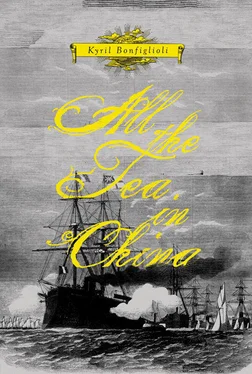He rolled a kindly yellow eyeball at me.
“Hot roll in the oven, Mr Cleef, sah. Only jess the one, if yo please; rest’s fo’ the Captain’s table — Maz Lubbock’s supping in de Cabin tonight.”
This gave me two other things to think about beside a watery grave: Lubbock and a hot roll. Unwilling to offend the Doctor, I fished one out, dancing it between my fingers until I could split it open. As I did so the Doctor reached over and spooned some hot onion and pork gravy onto it; I clapped the roll together and, feeling like a schoolboy, crept out of the galley and braved the wild winds and the weather-oh until I was back in the cabin. Peter was there, towelling his naked body, some dry clothes ready beside him, the soaked ones dripping from a piece of cod-line he had rigged from the edge of my bunk to a nail in the bulkhead.
“How uncommonly thoughtful of you, my dear chap,” he said, twitching the roll from my fingers, “you are clearly learning the ways of the sea, for you know enough to greet a mess-mate coming off watch with a bite of something hot and tasty.” I did not rob him of his illusions; I fumbled in my tin box for a Thin Captain’s biscuit to gnaw while I asked him whether our frail barque would survive the dreadful tempest. He spluttered a little: I believe that, had his mouth not been full of hot bread crammed with fried onions and delicious pork gravy, he would have laughed.
“I think,” he said gravely, having swallowed the last exquisite morsel and pulled on a fresh pair of drawers, “I think that we have ridden out this particular Act of God: Indeed, for some twenty or thirty hours we may have little more than a fresh wind until we sight Ushant.”
“Ushant?” I quavered. “What is that? I supposed that we were bound for the Indies and the China Coast. Why are we going to this Ushant?”
“We are not going there, Karli, we are looking for it. So soon as we see it we shall know where we are and shall leave it, God willing, on our port quarter. It is merely a headland which we must weather, d’you see.”
“Ah,” I said in an intelligent way.
“After Ushant we shall drive sou’west across the skirts of the Bay, of course.”
“Of course, Peter. This Bay is …?”
“Biscay,” he said solemnly. “Biscay. The weather there is often calm, mild and a joy to sailors.”
“Capital!” I cried.
“But never at this time of the year,” he went on. “At just this season the seas are as high as mountains, the winds seem the bitter enemies of man and many a tall ship has sunk without trace, dragging all hands down with her to Davy Jones’s Locker.”
“But, surely …” I began.
“Yes, surely, our little ship is well-found, well-officered and well-manned: we shall probably cross Biscay with the loss of but a few of us — and we can replace the spars which will be carried away with a few weeks of labour.”
“I see,” I said nonchalantly, fumbling in the tin box for another Thin Captain’s. My voice was perfectly steady.
“That is, of course, unless we fall in with the Portuguese sardinho-fishers,” he said.
“And what might they be?” I asked, my voice still steady. He lowered his voice, leaned towards me, his eyes wide.
“Fiends incarnate!’ he whispered. “Promise me, Karli, that you will put a bullet in my head rather than let me fall into the hands of those fiends!”
“I promise,” I quavered, a fragment of Thin Captain’s falling from my nerveless lips. He burst into laughter and staggered about the floor, incapacitated by mirth. Slowly I realised that this had been an English joke. I retrieved the piece of biscuit and munched it sternly. When Peter had recovered he saw my expression and was at once contrite, for he had a kindly nature, except in dealings with his own heart and health.
“Forgive me, Karli,” he cried, “we sailors reckon that we have a right to tweak the tails of landsmen: It helps us to endure our hardships, don’t you see, and it helps you to come to terms with the sea.”
“Of course,” I said stiffly. We Sephardim are proud people, you remember, we do not carney like the base Ashkenazim of the East. For my part, I have always been a supple man and slow to take offence, but I do not care to be made ridiculous. Except when I have chosen that rôle. There was a long silence, then Peter slipped out of the cabin. I remained standing up, anger and something else taking the place of my fear. My shoulders were braced against the edge of the upper bunk, for the ship was leaning over in that direction and was also pitching, rolling and yawing erratically. I no longer cared. A tear formed in my right eye; the room was smoky from the slush-lamp. I wiped it away with a corner of the blanket. I began to think of my mother, God knows why, and found that I needed the corner of the blanket again.
Peter came in, kicked the door shut and showed me the two hot rolls he had brought. They smelt ravishing. He proffered one but, like a fool, I jerked my head away and gazed in an absurd and dignified fashion at the ceiling.
“Karli,” said Peter, “I had to give the Doctor a shilling for these. Is it so hard to take one from your mess-mate, who meant no harm?” It became clear to me that I was being what an Englishman would call a silly ass. I took a roll with mumbled thanks and bit into its hot, crusty edge gratefully. My face I still kept turned away from him, for I did not wish him to see the traces of tears upon it; he might not have realised that they were caused by the smoke from the lamp. He said nothing more, he was that rare kind of man who knows when to keep his mouth shut.

What I found remarkable about the English Channel as we tacked lustily down it towards the fabled lights of Ushant, was that it was by no means a waste of cruel waters: it was more like the Strand on a warm Saturday night. Every kind of craft was running eastward or clawing westward as though the life of England depended upon them: wallowing colliers; big, fat, important Indiamen; slovenly hoys from Cornwall dripping China Clay; Breton crabbers; smacks and hovellers without number; the entire Brixham trawler fleet, hove-to and dancing on the green waves; a dangerous, rakish Excise cutter slashing along on some desperate errand and, a sight I would give a hundred pounds to see again, the Channel Fleet majestically making its way to Spithead in line astern under all plain sail. The Second explained to me that the snowy whiteness of the sails was because, on entering the Channel, the old, brown sails would have been taken down and the best suits bent onto the yards. As I watched, entranced, a stream of signal flags rose to the main-truck of the flagship and, like magic, her yards swung — you could hear the rattling boom of the canvas from our distance of eight hundred yards — and she went about on the other tack, followed, with terrifying precision, by each ship in her wake: I swear that the stretch of water on which they went about, one after the other, was no greater than a tennis-court. That was, I think, the moment at which I stopped laughing at the English.
I had another lesson to learn, however. As we came abreast of the flagship our Captain Knatchbull grunted orders to the First Mate about dipping our ensign.
“To the flagship, Sir?”
“To each ship in turn, Mister.”
“Aye aye, Sir.”
I blushed with shame at this silly impertinence, for we were, surely, but a common trading vessel and these lordly ships the might of the British Queen. My blushes, however, turned to a blush at my own ignorance and, yes, a flush of pleasure, as the flagship’s ensign dipped gravely to us in return, followed by the same civility from each man of war as she came abreast. Our men cheered heartily, swarming up the ratlines and waving hats and kerchiefs, but our Captain stalked to the other side and gazed fixedly at the coast. He was, I suppose, regretting something, as every sensible man must from time to time.
Читать дальше













